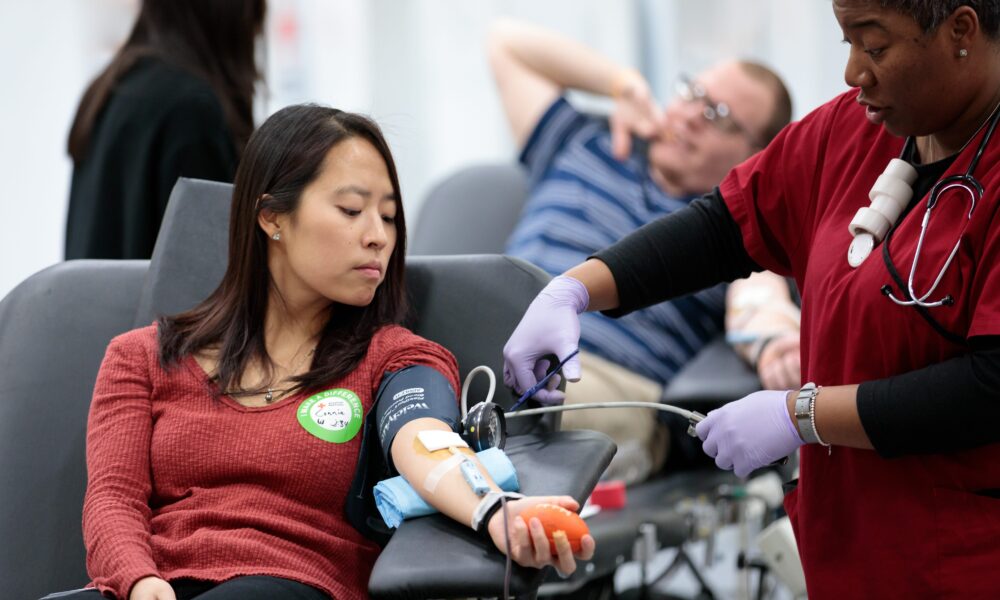Every 80 seconds, someone in Quebec needs blood. Héma-Québec, which marks its 25th anniversary this month, has been the unwavering supplier of blood products, human tissues, and other crucial donations to Quebec’s healthcare system. Their relentless efforts have long been amplified through partnerships with local communities. One such collaboration was the recent mobile blood drive on campus, open from Sept. 18 to 21, organized between Héma-Québec and the McGill Students’ Blood Donation Association (MSBDA).
“Our club’s goal has been to increase awareness about blood, plasma, and stem cells [in] McGill’s community. We have coordinated a lot with Héma-Québec, since they perform blood and plasma donations in the province, while remaining an independent club accredited by SUS (Science Undergraduate Society) and MSS (Medical Students’ Society),” Oban Lopez-Bassols, U3 Arts, Co-President of the MSBDA, wrote to The Tribune.
“We aim for around four blood drives which we organize in coordination with other school clubs,” Lopez-Bassols wrote. “We’ve found collaboration with faculties and clubs to be an incredibly useful way to get input on good times and places for blood drives, as well as effective promotion of the drives.”
Indeed, awareness of shortages and the urgent need for donations is crucial to sustaining Quebec’s healthcare system. While Héma-Québec is currently capable of fulfilling 100 per cent of the blood donation needs within the province, more has to be done concerning plasma.
“Extreme burn patients, for example, need a lot of plasma, often for weeks on end. So that’s a huge need there,” Lopez-Bassols wrote. “Quebec’s plasma self-sufficiency is around 30 per cent, which leaves our province having to purchase expensive plasma—usually from the United States. We incentivize everyone to donate whatever they feel more comfortable with, but when open, [to try giving] plasma.”
However, the barriers Quebec’s blood donation service faces do not stop at the plasma shortage. Especially for patients who need frequent blood transfusions, such as those receiving treatment for sickle cell disease or thalassemia, close blood type matches are needed to alleviate potential complications. These matches are best found in donors with similar racial or ethnic backgrounds—thus marking the need for diversity in blood donations.
Upon further discussion on ethnicity and compatibility, Lopez-Bassols shared an article presented by Canadian Blood Services, underscoring that, “Right now, Canadian Blood Services Stem Cell Registry is not as diverse as Canada’s population. Though there are over 400,000 people registered with Canadian Blood Services Stem Cell Registry, only 33 per cent of potential donors come from Indigenous, Asian, South Asian, Hispanic, mixed-race[,] and diverse Black communities.”
He continued, “It’s especially crucial for stem cells since compatibility in it can be very hard to find. […] For Black History Month, we have [had] heavy promotion of this inequality but we’re still working on messaging and increasing diversity of the registry.”
Yet Héma-Québec and Canadian Blood Services, along with other blood donation organizations worldwide, have not always been a welcoming place. Discriminatory policies, especially those against members of the 2SLGBTQIA+ community due to prejudiced fears around HIV/AIDS, have left a lasting impact, and awareness is critical to eradicating such stigma and unfounded regulations.
“The blood ban was very controversial and exclusionary, so it was very hard for us to still promote blood drives while pressuring Héma-Québec to have more open access to donating,” Lopez-Bassols wrote.
In recent years, Quebec and Canada as a whole have taken strides in dismantling discriminatory bans that previously prevented men who have sex with men from donating blood. Since Dec. 4, 2022, Héma-Québec has transitioned into gender-neutral questionnaires, assessing blood donation eligibility on what it calls ‘[an] individual basis in line with personal behaviours,’ rather than sexual orientation and gender identity.
And as Héma-Québec celebrates its quarter-of-a-century anniversary, the spotlight is on paving the way towards a more equitable healthcare system here within the province. With each donation of blood, McGill students could save up to three lives—taking part promptly and directly in public health endeavours.









